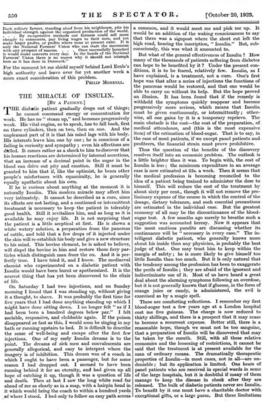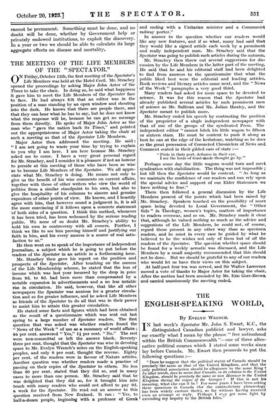THE MIRACLE OF INSULIN.
[By A PATIENT.] THE diabetic patient gradually drops out of things; he cannot command energy or concentration for work. He has no " steam up," and becomes progressively weak. His vital engine, so to speak, has to fall back, first on three cylinders, then on two, then on one. And the unpleasant part of it is that his mind lags with his body. His interests leave him one by one ; he is conscious of a failing in curiosity and sympathy ; even his affections are (Ailed. It comes rather as a shock to him to discover that his human reactions are determined by internal secretions, that an increase of a decimal point in the sugar in the blood can drive out pity and emotion. Still it must be granted to him that if, like the optimist, he bears other people's misfortunes with equanimity, he is generally equally apathetic about his own.
If he is curious about anything at the moment it is naturally Insulin. This modern miracle may affect him very intimately. It cannot be described as a cure, since its effects are not lasting, and a continued or intermittent treatment is necessary to keep the patient in tolerably good health. Still it revitalizes him, and as long as it is available he may enjoy life. It is not surprising that the patient is a little sceptical at first. He is shown a white watery solution, a preparation from the pancreas of cattle, and told that a few drops of it injected under the skin will re-establish his body and give a new structure to his mind. This bovine element, he is asked to believe, will dispel the bovine in him and restore those fiery par- ticles which distinguish man from the ox. And it is per- fectly true. I have tried it, and I know. The mediaeval chemist who experimented on a diabetic patient with Insulin would have been burnt or apotheosized. It is the nearest thing that has yet been discovered to the elixir of life.
On Saturday I had two injections, and on Sunday morning I found that I was standing up, without giving it a thought, to shave. It was probably the first time for five years that I had done anything standing up which I Might have done sitting down. I no longer felt " as if I had been born a hundred degrees below par." I felt sociable, responsive, and clubbable again. If the poison disappeared as fast as this, I would soon be singing in my bath or running upstairs to bed. It is difficult to describe the sense of well-being and escape after the first few injections. One of my early Insulin dreams is to the point. The dreams of sick men and convalescents are generally allegorical, and easy to interpret where the imagery is of inhibition. This dream was of a coach in which I ought to have been a passenger, but for some reason I had dropped out. I seemed to have been running behind it for an eternity, and had given up all hope of catching it up, though it was a question of life and death. Then at last I saw the long white road far ahead of me as clearly as in a map, with a hairpin bend in it which would bring the coach to within a hundred yards .of where I stood. I had only to follow an easy path across a common, and it would meet me and pick me up. It would be an addition of the waking consciousness to say that there was a signpost where the short cut left the high road, bearing the inscription, " Insulin." But, sub- consciously, this was what it amounted to.
But what of the general effectiveness of Insulin ? How many of the thousands of patients suffering from diabetes can hope to be benefited by it ? Under the present con- ditions, it is to be feared, relatively few. Insulin, as I have explained, is a treatment, not a cure. One's first hope was that after a series of injections the functions of the pancreas would be restored, and that one would be able to carry on without its help. But the hope proved an illusion. It has been found that if the remedy is withheld the symptoms quickly reappear and become progressively more serious, which means that Insulin must be given continuously, or intermittently ; other- wise, all one gains by it is a temporary reprieve. The main obstacle is the cost—the cost of the preparation, of medical attendance, and (this is the most expensive item) of the estimation of blood-sugar. That is to say, in the case of most patients, if we except panel patients and profiteers, the financial strain must prove prohibitive.
Thus the question of the benefits of the discovery resolves itself into an economic problem. The outlook is a little brighter than it was. To begin with, the cost of Insulin is less ; the minimum expenditure in an average case is now estimated at 25s. a week. Then it seems that the medical profession is becoming reconciled to the idea of a patient being trained to administer the dose to himself. This will reduce the cost of the treatment by about sixty per cent., though it will not remove the pre- liminary expense of the course in which the control of the dosage, dietary tolerance, and such essential precautions are estimated in the individual case. But the greatest economy of all may be the discontinuance of the blood- sugar test. A few months ago merely to breathe such a suggestion was accounted heresy. Now it appears that the most cautious pundits are discussing whether its continuance will be " necessary in every case." The in- telligent diabetic patient, who generally knows more about his inside than any physician, is probably the best judge of that. One may trust him to keep within the margin of safety ; he is more likely to give himself too little Insulin than too much. But it is only natural that the tendency among the profession has been to exaggerate the perils of Insulin ; they are afraid of the ignorant and indiscriminate use of it. Most of us have heard a great deal about the alarming symptoms following an overdose, but it is not generally known that if glucose, in the form of orange juice or candy, is administered, the evil is exorcised as by a magic spell.
These are comforting reflections. I remember my first blood-sugar test a few years ago at a London hospital cost me five guineas. The charge is now reduced to thirty shillings, and there is a prospect that it may cease to become a recurrent expense. Better still, there is a reasonable hope, though we must not be too sanguine, that a preparation of Insulin will be discovered that may be taken by the mouth. Still, with all these relative economies and the loosening of restrictions, it cannot be said that the treatment is at present available for the man of ordinary means. The dramatically therapeutic properties of Insulin—in most cases, not in all—are un- deniable ; but its application is limited. One hears of panel patients who are received in special wards in some of the large hospitals, but it is doubtful if many of them manage to keep the disease in check after they are released. The bulk of diabetic patients never see Insulin. To benefit by it one must have a charitable doctor with exceptional gifts, or a large purse. But these limitations cannot be permanent. Something must be done, and no doubt will be done, whether by Government help or privately endowed institutions, to exploit the discovery. In a year or two we should be able to calculate its large aggregate effects on disease and mortality.











































 Previous page
Previous page